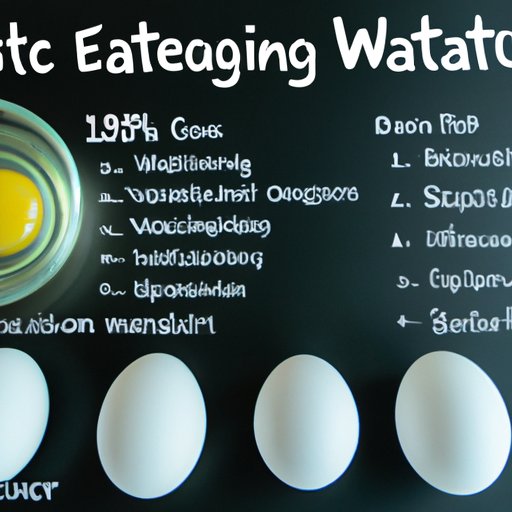Introduction
Eggs are one of nature’s most nutrient-dense foods. They are rich in vitamins, minerals, healthy fats, and high-quality protein. Eating eggs can provide numerous health benefits, such as improved heart health, weight loss, and increased energy levels. While eggs are incredibly nutritious, the debate over which part of the egg is healthier has been ongoing. In this article, we will explore the nutritional benefits of egg whites and yolks to help you decide which is best for your own health.
Comparison of Nutritional Benefits of Eating Egg Whites vs Yolks
To understand which part of the egg is better for your health, it is important to understand the differences between egg whites and egg yolks. Egg whites are the clear liquid that surrounds the yolk and contain mostly water and proteins. Egg yolks are the yellow-orange center of the egg and are composed of fat, cholesterol, and various vitamins and minerals. Below, we will look at the nutrient breakdown of both parts of the egg.
Nutrient Breakdown of Egg Whites
Egg whites are a good source of protein, containing about 4 grams per large egg white. They are low in calories and fat, and are virtually carbohydrate-free. Egg whites also contain small amounts of calcium, iron, zinc, potassium, and other essential vitamins and minerals. Additionally, egg whites are a rich source of riboflavin and selenium.
Nutrient Breakdown of Egg Yolks
Egg yolks are an excellent source of many vitamins and minerals, including vitamin A, vitamin D, folate, iron, phosphorus, and zinc. They also contain approximately 5 grams of fat and 3 grams of protein per yolk. In addition, egg yolks are a great source of healthy omega-3 fatty acids, which are linked to numerous health benefits, such as reduced inflammation and improved brain function.
Pros and Cons of Eating Egg Whites
Eating egg whites offers some benefits, such as being lower in calories and fat than egg yolks. Additionally, egg whites are a great source of lean protein, making them a popular choice among those looking to build muscle. However, since egg whites do not contain any cholesterol or fat-soluble vitamins, they may be lacking in certain essential nutrients.
Pros and Cons of Eating Egg Yolks
Egg yolks are a great source of essential vitamins and minerals, such as vitamin A, vitamin D, and omega-3 fatty acids. Additionally, they are a good source of protein and contain beneficial cholesterol, which plays an important role in maintaining healthy cell membranes. On the downside, egg yolks are higher in calories and fat than egg whites, and they may raise cholesterol levels in some individuals.

Exploring the Health Benefits of Eating an Egg a Day
Eating an egg a day can provide numerous health benefits. Below, we will look at some of the most notable benefits associated with eating eggs on a regular basis.
Heart Health Benefits
Eggs are a great source of choline, which is an essential nutrient that helps maintain healthy cell membranes. Studies have shown that consuming choline can reduce the risk of cardiovascular disease and stroke by reducing inflammation and improving blood vessel health. Additionally, eggs are a good source of lutein and zeaxanthin, two antioxidants that can help protect against oxidative damage and reduce the risk of heart disease.
Weight Loss Benefits
Eggs are an excellent source of protein and can help keep you feeling full for longer periods of time. Additionally, eggs contain several essential vitamins and minerals that can help support metabolism and promote weight loss. Research has shown that people who eat eggs for breakfast tend to consume fewer calories throughout the day than those who don’t.
Other Health Benefits
Eating eggs regularly can also offer a number of other health benefits. For example, eggs are a good source of vitamin B12, which is important for proper nerve and brain function. Additionally, eggs are a rich source of lutein and zeaxanthin, two antioxidants that can help protect against age-related vision problems. Finally, eggs may help improve cognitive function and memory, as they contain choline, which is essential for brain development.

An Overview of the Unique Nutrients Found in Egg Whites
Egg whites are a great source of several essential vitamins and minerals. Below, we will look at the protein, vitamin, and mineral content of egg whites.
Protein Content
Egg whites are a great source of lean protein, providing about 4 grams per large egg white. Protein is essential for building muscle, maintaining a healthy weight, and supporting overall health. Additionally, protein helps keep you feeling full for longer periods of time.
Vitamin Content
Egg whites are a good source of several vitamins, including vitamins A, B2, B6, and B12. Additionally, they are a rich source of riboflavin, which is important for proper growth and development. Vitamin B12 is particularly important for proper nerve and brain function.
Mineral Content
Egg whites are a good source of several minerals, including calcium, iron, zinc, and potassium. Calcium is important for strong bones and teeth, while iron is essential for transporting oxygen throughout the body. Zinc and potassium help regulate blood pressure and keep the immune system functioning properly.

Understanding the Health Benefits of Eating Whole Eggs
Eating whole eggs offers a multitude of health benefits. Whole eggs contain all of the essential vitamins and minerals found in egg whites and yolks, as well as healthy fats and cholesterol. The nutrient profile of whole eggs is as follows:
- 7 grams of protein
- 5 grams of fat
- 1 gram of carbohydrates
- 212 mg of cholesterol
- Vitamins A, B2, B5, B12, D, and E
- Minerals such as calcium, iron, magnesium, phosphorus, potassium, and zinc
In addition to providing essential vitamins and minerals, eating whole eggs can provide a number of health benefits, such as improved heart health, weight loss, and increased energy levels. Additionally, whole eggs are a great source of choline, which is essential for proper brain development.
Potential Risks
While eating eggs can provide numerous health benefits, it is important to note that there are some potential risks associated with consuming too many eggs. For example, eggs are high in cholesterol and can increase LDL (bad) cholesterol levels in some individuals. Additionally, eggs may increase the risk of foodborne illnesses, such as salmonella, if they are not cooked properly.
Conclusion
Eggs are one of nature’s most nutrient-dense foods, offering numerous health benefits. While egg whites are lower in calories and fat and contain more protein, egg yolks are richer in vitamins and minerals. Eating an egg a day can provide numerous health benefits, such as improved heart health, weight loss, and increased energy levels. Additionally, egg whites are a great source of lean protein and contain several essential vitamins and minerals. Finally, eating whole eggs can provide all of the benefits of egg whites and yolks, as well as healthy fats and cholesterol.
Overall, eggs are an incredibly nutritious food and can provide numerous health benefits. Whether you choose to eat just the egg whites or the whole egg, you can rest assured that you are getting a variety of essential vitamins, minerals, and healthy fats. As with all foods, it is important to enjoy eggs in moderation and to cook them properly to avoid foodborne illness.
(Note: Is this article not meeting your expectations? Do you have knowledge or insights to share? Unlock new opportunities and expand your reach by joining our authors team. Click Registration to join us and share your expertise with our readers.)
